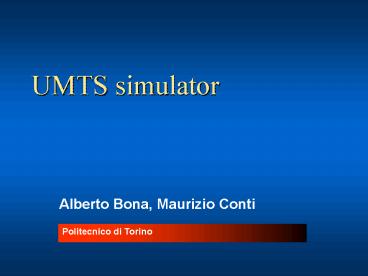UMTS simulator - PowerPoint PPT Presentation
1 / 24
Title:
UMTS simulator
Description:
... equal to 1 frame (10 ms) Advantages: Bit rate can be varied every TTI ... RACH will be used for low bit-rate data transmissions which don't need high throughput ... – PowerPoint PPT presentation
Number of Views:141
Avg rating:3.0/5.0
Title: UMTS simulator
1
UMTS simulator
- Alberto Bona, Maurizio Conti
Politecnico di Torino
2
Scenario(1)
- General Assumption
- Simulator time step is equal to 1 frame (10 ms)
- Advantages
- Bit rate can be varied every TTI
- Transport channel accuracy
- Simpler and faster
- Limitations
- Power control is slot based ? neglected
- RACH and CPCH collisions are modelled on a frame
basis
2
Alberto Bona, Maurizio Conti
3
Scenario(2)
- 1 RNC ? SRNC ? CRNC
- Simulation of intra-RNC handover is possible
- Simulation of inter-RNC handover is not precluded
- Node-B number is an input parameter
- Node-B inherits generic-BTS behaviour adding UMTS
features - Structure is adherent to UMTS standards
3
Alberto Bona, Maurizio Conti
4
Scenario(3)
- RNC maintains (UTRAN-side) peer-UE protocol
instantiation - RNC creates RRC layer which is responsible for
channel allocation - RNC maintains UE schedulation references
- Each Node-B has a MAC_CSH entity responsible for
common transport channel transmission and
reception
4
Alberto Bona, Maurizio Conti
5
Protocol implementation(1) RACH
- Its an uplink transport channel
- Slotted-aloha based, allows transmission of 1
frame - UE has to restart access procedure for each
transmission - RACH will be used for low bit-rate data
transmissions which dont need high throughput
5
Alberto Bona, Maurizio Conti
6
Protocol implementation(2) CPCH
- Its an uplink transport channel
- Slotted-aloha based with fast acquisition
indication and collision detection - UE, once access has been completed, is the owner
of the code for NMAX consecutive frames - CPCH will be used for data transmissions which
require higher throughput
6
Alberto Bona, Maurizio Conti
7
Protocol implementation(3) DSCH
- Its a downlink transport channel
- UE share the same code, multiplexed on a frame by
frame basis - UE multiplexing is granted through polling on a
signalling channel (at present Round Robin) - DSCH will be used for non real time traffic WWW,
FTP...
7
Alberto Bona, Maurizio Conti
8
UE-structure (MAC_D)
- RB_mapping_info data (priority, log-CH_ID) for
log-CH to tr-CH mapping - C/T switch routes PDU towards TX buffers
- TX buffers on DCH or on common tr-CH
- DCH TF Transport Format for DCH variable every
TTI - C/T demux allows demultiplexing of blocks from
tr-CH to log-CH
8
Alberto Bona, Maurizio Conti
9
UE-structure (MAC_CSH)
- TCTF-Insert data and signalling multiplexing on
transport channels - TX Buffers on RACH and CPCH
- RACH and CPCH TF TF for transport channels
- TCTF-Read data (towards MAC_D) and signalling
blocks demultiplexing
9
Alberto Bona, Maurizio Conti
10
UTRAN-structure (MAC_CSH)
- Sheduling-Priority Handling selects UE for TX on
common transport CH. - Controllers
- RACH manages collisions with a frame based model
- CPCH manages collisions (as RACH) and provides
codes for UE transmissions - MAC_D list maintains info about UE under Node B
control
10
Alberto Bona, Maurizio Conti
11
UMTS validation tests and simulations
- Alberto Bona, Maurizio Conti
Politecnico di Torino
12
Validation tests RACH
- Transfer delay has constant characteristics
- Increasing UE number, arrived packets decrease
because of collision - Mean transfer delay is independent by UE number
12
Alberto Bona, Maurizio Conti
13
Validation tests CPCH
- 1 IP packet is transferred releasing signature ?
more than 1 max in picture - 1 IP packet needs 3 signature allocation to be
transferred - time between max is due to signature contention
or lack of codes
13
Alberto Bona, Maurizio Conti
14
UMTS traffic sources
- Based on UMTS 30.03
- 25 packet per ON session OFF session 3 s
- 480 byte per packet
- UDD64
- constant interarrival time between packets 62.5
ms - 2 blocks per frame
- 320 bit per block
- UDD144
- constant interarrival time between packets 27 ms
- 4 blocks per frame
- 360 bit per block
14
Alberto Bona, Maurizio Conti
15
RACH Results collision probability
15
Alberto Bona, Maurizio Conti
16
RACH Results throughput
16
Alberto Bona, Maurizio Conti
17
CPCH Results blocking probability
17
Alberto Bona, Maurizio Conti
18
CPCH Results throughput
18
Alberto Bona, Maurizio Conti
19
CPCH Results MAC transfer delay
19
Alberto Bona, Maurizio Conti
20
DSCH Results throughput-UDD144
20
Alberto Bona, Maurizio Conti
21
DSCH Results MAC transfer delay
21
Alberto Bona, Maurizio Conti
22
GPRS-UMTS Comparison(1)
- GPRS model 1 PDCH signalling, 7 PDCH data,
dynamic allocation, Round Robin scheduling - UMTS model 3 codes per transport channel
- Traffic source UDD64
26
Alberto Bona, Maurizio Conti
23
GPRS-UMTS Comparison(2)
27
Alberto Bona, Maurizio Conti
24
GPRS-UMTS Comparison(3)
28
Alberto Bona, Maurizio Conti































